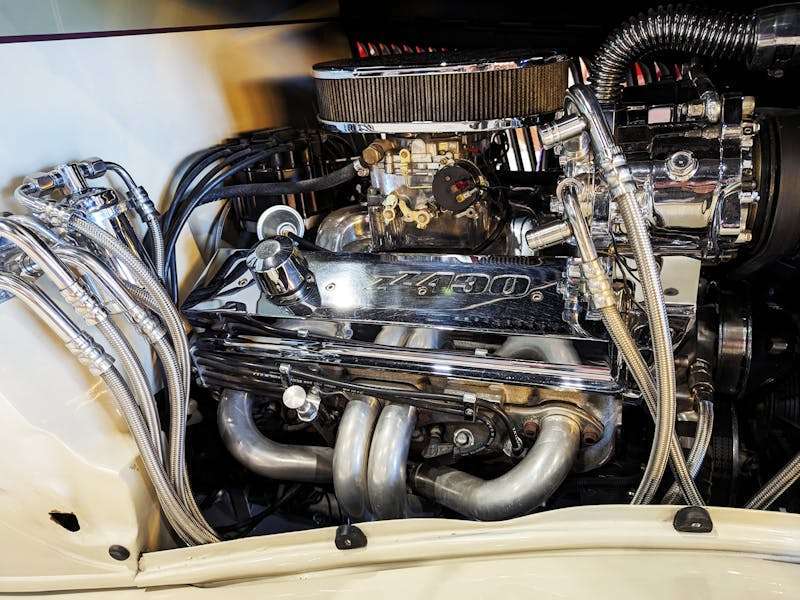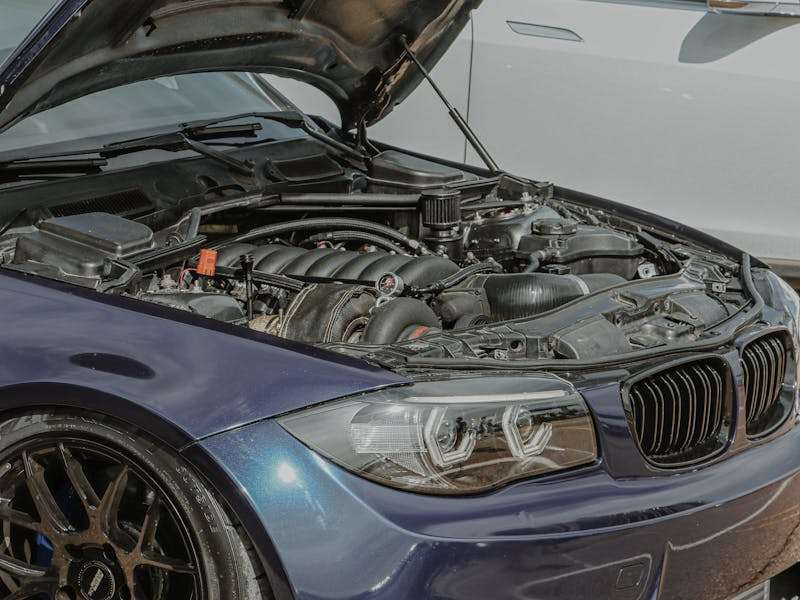An exhaust manifold leak compromises the escape of exhaust gases leading to reduced engine power and efficiency. Issues involving the vehicle exhaust systems have significant consequences for your engine’s performance.
Not only do leaks impact engine performance, but they can also contribute to increased emissions and noise pollution. Addressing these leaks promptly is crucial to avoid further damage.
The exhaust manifold, which connects the exhaust pipes to the engine cylinders, is particularly susceptible to cracks and failures due to the intense heat and constant cycles of expansion and contraction.
Whenever you notice a hissing sound or smell unusual odors, investigate whether you’re having an exhaust manifold leak. Taking action at the first sign of exhaust manifold problems will prevent more extensive damage and ensure your vehicle operates at its best.
How to determine if your exhaust manifold is leaking.
In order to determine if your exhaust manifold is leaking start with a visual inspection for visible cracks or damage, listen for unusual hissing or ticking sounds, and perform a smoke test to identify leaks.
- Visual inspection for visible cracks or damage.
Look closely at your exhaust manifold for any visible cracks or damage. Check for signs of rust or corrosion on the surface. Pay attention to any gaps or holes that may indicate a leak.
- Listening for unusual hissing or ticking sounds.
Start your engine and listen carefully for any hissing or ticking sounds coming from the exhaust manifold area. Note any unusual noises that could be a sign of a leak. Be aware of any changes in sound when accelerating or decelerating.
- Performing a smoke test to identify leaks.
Park your vehicle in a well-ventilated area. With the engine off, cover the tailpipe securely with a rag or cloth.
Connect a smoke machine to the intake system of your vehicle. Turn on the smoke machine and let it fill the system with smoke. Inspect the exhaust manifold area for any smoke escaping, indicating a leak.
Determine if your exhaust manifold is leaking without needing professional assistance by following these steps. Visually inspect for cracks or damage, listen for unusual sounds, and perform a smoke test to identify exhaust manifold leaks effectively.
Symptoms of exhaust manifold leaks.
Engine noise during acceleration, strange smells, or decreased fuel efficiency in your vehicle are some of the symptoms of exhaust manifold leaks.
If you’re noticing some strange signs while driving, it might be worth investigating whether you have an exhaust manifold leak. Here are a few symptoms to watch out for:
- Increased engine noise during acceleration.
Have you noticed your engine getting louder when you step on the gas? This could be a sign of an exhaust manifold leak. The escaping gases can create a hissing or ticking sound that wasn’t there before.
- Decreased fuel efficiency.
Is your vehicle suddenly guzzling more fuel than usual? An exhaust manifold leak can disrupt the proper air-fuel mixture in the engine, causing it to run less efficiently. Keep an eye on your gas mileage and see if it starts to drop unexpectedly.
- Unpleasant smell of exhaust fumes inside the vehicle.
If you’re catching whiffs of exhaust fumes inside your car, it’s not just unpleasant—it could indicate an exhaust manifold leak. When the gasket or seal around the manifold fails, those noxious fumes can make their way into the cabin.
Exhaust manifold leaks shouldn’t be ignored. They can lead to further damage and potentially harmful situations. Address these symptoms promptly if you notice them.
Regular maintenance and inspections will help prevent these problems from occurring in the first place. Stay vigilant and take care of any issues as soon as they arise to ensure a smooth and safe driving experience.
Managing and addressing exhaust manifold leaks.
When managing and addressing exhaust manifold leaks start by regular inspection for early detection, undertake repair or replacement and consult a professional for assistance.
- Regular inspection for early detection.
Regularly inspect your exhaust manifold and surrounding components in the engine bay. Look for signs of damage, such as cracks or rust, which may indicate a potential leak. Pay attention to any unusual noises or smells coming from the engine area.
- Options for repair or replacement.
If the manifold gasket is the culprit, it can often be replaced without replacing the entire manifold. In cases where the manifold itself is damaged, a complete replacement might be necessary.
Consider consulting with an auto repair professional to determine the best course of action based on your specific situation.
- Seeking professional assistance for complex repairs.
Complex repairs involving exhaust manifolds should be handled by experienced professionals. Professionals have the expertise and tools required to diagnose and fix issues accurately. Attempting complex repairs without proper knowledge can lead to further damage or safety hazards.
When dealing with an exhaust manifold leak, prompt action is crucial. Ignoring this issue will result in several problems.
For example, decreased fuel efficiency and potential damage to other engine components like the catalytic converter. Prevent toxic gases from entering your vehicle cabin by promptly addressing these leaks.
Regular maintenance services play a vital role in preventing gasket failure and other issues related to exhaust manifolds. Avoid costly repairs down the line by scheduling routine inspections and addressing any leaks early on.
Risk considerations of driving with a manifold leak.

Potential damage to other engine components, risk of carbon monoxide poisoning in the cabin and facing legal implications due to increased emissions are some of the risk considerations of driving with a manifold leak.
Exhaust manifold leaks in your vehicle will lead to several risks and considerations that should not be taken lightly. Ignoring these issues can result in potential damage to other engine components, the risk of harmful gases like carbon monoxide entering the cabin, and legal implications due to increased emissions.
- Potential damage to other engine components.
When there is a manifold leak, it can cause a disruption in the proper functioning of your vehicle’s exhaust system. This can lead to increased strain on other engine components such as the catalytic converter or oxygen sensors. Over time, this strain may cause premature wear and tear, leading to costly repairs.
- Risk of carbon monoxide poisoning in the cabin.
Manifold leaks allow harmful gases, including carbon monoxide, to escape from the exhaust system. Carbon monoxide is an odorless and colorless gas that can be extremely dangerous if inhaled in high concentrations. Breathing in carbon monoxide can lead to symptoms like headaches, dizziness, nausea, or even more severe health issues.
- Legal implications due to increased emissions.
A leaking exhaust manifold can result in higher emissions from your vehicle. Increased emissions may violate local environmental regulations and emission standards. Depending on where you live, driving with a manifold leak could potentially result in fines or penalties from authorities.
It is crucial not to underestimate the risks associated with manifold leaks. If you suspect an issue with your exhaust manifold or notice any symptoms such as unusual noises or decreased performance from your vehicle’s engine, it is advisable to have it inspected by a qualified mechanic as soon as possible. Taking prompt action will help prevent further damage and ensure both your safety and compliance with applicable laws.
Remember, always prioritize regular maintenance and address any potential issues promptly for a safer driving experience.
The cost of repairing an exhaust manifold leak.
It’s important to consider the cost of repairing an issue like symptoms associated with an exhaust manifold leak. While the exact price will vary depending on factors like your location and the make and model of your vehicle, it’s essential to budget for this repair as soon as possible.
Ignoring or delaying a repair could lead to more significant damage and higher costs down the line. To get an accurate estimate, it’s best to consult a trusted mechanic who specializes in exhaust systems.
They will be able to assess the extent of the leak and provide you with an estimate for parts and labor. Addressing this issue promptly will help prevent further damage to your engine and ensure optimal performance.

